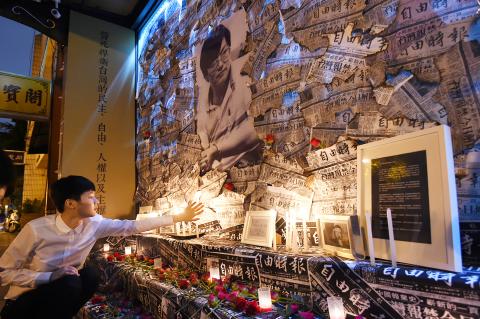The Executive Yuan yesterday announced that April 7 would be Freedom of Expression Day to commemorate the death of democracy activist Deng Nan-jung (鄭南榕), who died on April 7, 1989.
Premier Lin Chuan (林全) said that the democracy and freedom that Taiwanese enjoy is the result of past civil rights movements, and Deng paved the way for reform as his actions aroused public awareness of the importance of freedom of speech.
On April 7, 1989, Deng, then editor-in-chief of Freedom Era Weekly, set himself on fire as police attempted to break into his office after he had been barricaded inside for 71 days to avoid arrest after he was charged with sedition for the anti-government views expressed in his magazine, which published a draft “Republic of Taiwan constitution” in 1988.

Photo: Chang Chia-ming, Taipei Times
At the time, Article 100 of the Criminal Code banned the advocacy of replacing the Republic of China Constitution to mark the founding of a new nation, with those convicted liable to be sent to prison for life.
The article was amended in 1992, making it punishable only when such advocacy involves the use of violence.
President Tsai Ing-wen (蔡英文), when attending a ceremony to commemorate the 27th anniversary of Deng’s death in New Taipei City’s Jinshan District (金山) this year, said her administration would make the day Freedom of Expression Day to commemorate the activist, which had been one of Tsai’s election campaign pledges.
The designation and celebration of Freedom of Expression Day is to familiarize the public with the meaning of the freedom of speech, Executive Yuan spokesman Hsu Kuo-yung (徐國勇) quoted the premier as saying.
Government agencies, including the Ministry of Education and the Ministry of Culture, have been asked to organize celebratory events and commemorative programs to deepen public awareness of democracy, Hsu said.
Additional reporting by CNA

DEFENSE: The National Security Bureau promised to expand communication and intelligence cooperation with global partners and enhance its strategic analytical skills China has not only increased military exercises and “gray zone” tactics against Taiwan this year, but also continues to recruit military personnel for espionage, the National Security Bureau (NSB) said yesterday in a report to the Legislative Yuan. The bureau submitted the report ahead of NSB Director-General Tsai Ming-yen’s (蔡明彥) appearance before the Foreign and National Defense Committee today. Last year, the Chinese People’s Liberation Army (PLA) conducted “Joint Sword-2024A and B” military exercises targeting Taiwan and carried out 40 combat readiness patrols, the bureau said. In addition, Chinese military aircraft entered Taiwan’s airspace 3,070 times last year, up about

Taiwan is stepping up plans to create self-sufficient supply chains for combat drones and increase foreign orders from the US to counter China’s numerical superiority, a defense official said on Saturday. Commenting on condition of anonymity, the official said the nation’s armed forces are in agreement with US Admiral Samuel Paparo’s assessment that Taiwan’s military must be prepared to turn the nation’s waters into a “hellscape” for the Chinese People’s Liberation Army (PLA). Paparo, the commander of the US Indo-Pacific Command, reiterated the concept during a Congressional hearing in Washington on Wednesday. He first coined the term in a security conference last

A magnitude 4.3 earthquake struck eastern Taiwan's Hualien County at 8:31am today, according to the Central Weather Administration (CWA). The epicenter of the temblor was located in Hualien County, about 70.3 kilometers south southwest of Hualien County Hall, at a depth of 23.2km, according to the administration. There were no immediate reports of damage resulting from the quake. The earthquake's intensity, which gauges the actual effect of a temblor, was highest in Taitung County, where it measured 3 on Taiwan's 7-tier intensity scale. The quake also measured an intensity of 2 in Hualien and Nantou counties, the CWA said.

The Overseas Community Affairs Council (OCAC) yesterday announced a fundraising campaign to support survivors of the magnitude 7.7 earthquake that struck Myanmar on March 28, with two prayer events scheduled in Taipei and Taichung later this week. “While initial rescue operations have concluded [in Myanmar], many survivors are now facing increasingly difficult living conditions,” OCAC Minister Hsu Chia-ching (徐佳青) told a news conference in Taipei. The fundraising campaign, which runs through May 31, is focused on supporting the reconstruction of damaged overseas compatriot schools, assisting students from Myanmar in Taiwan, and providing essential items, such as drinking water, food and medical supplies,